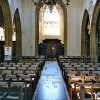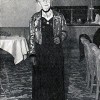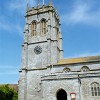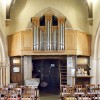“My father used to say he’d been at it so long. Fifty-two years, including Sundays he’d a-call it, as shepherd. No holidaying in those days. But he loved it. His family, his dog, and his sheep and lambs, were life to Christopher Bishop.”
The words of Gertrude Burt, talking in 1970 to journalist Maynard Whyte about her father, four years before she died at the age of 91 years.
Our story starts and ends just a couple of miles or so from the border with Somerset in the north west of the county where the villages are small and picturesque. It is here that Christopher Bishop was born two years into the reign of Queen Victoria and it is where he grew-up and worked all his life save for a short sojourn at Osmington, a parish by the sea near to Weymouth and where he buried two of his sons.
Melbury Bubb is a little village of a few cottages, an Elizabethan manor house and a farm. It is here on the 24th of July 1791 that Benjamin Bishop was baptised in the church dedicated to St. Mary. We will have more to say about this delightful church with its interesting old tower, ancient font and windows telling the parable of the Wise and Foolish Virgins but that is for another time. Benjamin was destined to become an agricultural labourer and along the way, on June 5th in 1815, he married a Somerset girl, Caroline Gard, at St. James church at East Chelborough. There is more to say about this little church as well; here we will just note that it is difficult to find but well worth the seeking out just to see the unusual round east window.
Benjamin and Caroline Bishop had nine children, the last being Christopher, who was born in the early half of 1839 at East Chelborough. Leaving school at the age of ten he probably didn’t have a lot of choice but to become an agricultural labourer. He started his working life scaring birds off the crops on Jericho field at Ryme Intriniseca. The 1851 census tells us this was his lot in life. But things were looking up for him and ten years on, the census records him being a shepherd at Melbury Osmond, where he was employed by Mr Thomas Watts, a farmer of 260 acres employing four men, three boys and two women. It is here that Christopher met Jane Hallet, his wife to be.
Christopher and Jane married in 1862 and their first child, George, was born at Halstock in 1863. Two more boys, Benjamin and William, arrived while the couple were back at Melbury Osmond in 1870 and 1873; their daughter Gertrude was born at Osmington in 1884. That year the shepherd and his wife were to lose their eldest son. He followed his father into farm work and later he joined the railway and was employed at Nine Elms in London where he contracted typhus and died. George was buried at St. Osmond’s church, Osmington, on the 11th of December 1884.
In 1891 Christopher, his wife Jane and daughter Gertrude were back in the north west of the county at Ryme Intrinseca and visiting them was their son Benjamin then 21 years-old he was a stoker on a ship in the Navy.
Gertrude’s brother William was in the Marines. One day he was working on a gun and accidentally thrown backwards into the sea and drowned; it was thought that a chain held him under the water. He was Gertrude’s favourite. She told Maynard Whyte: “he was so kind and used to pick me up and carry me home if he met me in the village. He was just twenty, I was nine at the time. When the letter came, my mother, who could not read, had to get someone from the village to read it to her. Then she said to me ‘Go down, Gertrude, and tell your father’…I could go again to that spot where I told him and know it. He took it bad as he was the one who could never shed a tear…It’s always worse for them kind, isn’t it?”
At the time of William’s death the family was at Ryme Intrinseca but William was buried on the 9th of November 1892 in St. Osmond’s churchyard at Osmington, where his elder brother lay. His death was a great sorrow to their mother. Jane Bishop passed away in 1895 aged 52 years. Gertrude, then just eleven years old, was left to comfort her father and she “kept house” for him recalling “no mod-cons for them, a bucket dipped into the well brought up the water.”
Lambing was always in the open field in her father’s day. Gertrude recalled: “they used to thatch the hurdles and put them up for shelter. When we had been up all night with the sheep in the lambing season, and tired out, I used to see to the lambs and sheep, I used to walk out among them and see they were all right, but they always were all right. Father would not have gone to bed if he’d not have known that. …you get many more sheep lambing on a rough, wet and windy night than on a still, cold frosty one.” The lambs were fat by Easter and the shepherd with his dog would drive them along to Yetminster Station.
Christopher Bishop died in 1908. He would have been 69 and for 52 of those years he had been a shepherd. He spent his last few years living with Gertrude and her husband, who was a gamekeeper. As in the beginning so it was at the end – he liked to sit in the fields and scare the crows away from the young pheasant birds.
Up to the end of his working days he earned no more than eleven shillings a week, but his daughter observed “…you could get a nice big piece of beef for one and six and we had plenty of our own vegetables. Coal was a shilling a hundredweight.” Thinking back, Gertrude said “They were good days..You didn’t have the money…You didn’t have the clothes, but you were far happier…They days were better than they be now, I fancy.”
In paintings and novels the role of shepherd is sometimes romanticised as an idyllic life. True, a shepherd might have commanded a couple of shillings more for his labour than an ordinary agricultural labourer but as Thomas Hardy observed, the shepherd is “a lonely man of which the battle of life had always been sharp with him.”



